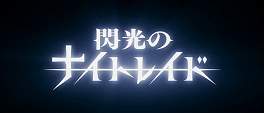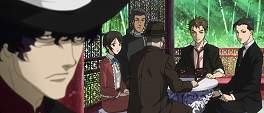Senkou no Night Raid is ambitions in many respects: it features a selection of spoken languages including Chinese, Russian and heavily accented Japanese and it takes place in a time when Japan's misguided "Co-Prosperity Sphere" idealism was still prevalent. That the series comes from A1 Pictures, responsible for Kannagi and Sora no Woto, and like the latter series is aired within the "Anime no chikara" (The Power of Anime) slot; its pedigree not in question. The first three episodes then demonstrate a series confident in story but shy with characters - a tale of espionage and artifice told using adolescents with super powers. With an estimated thirteen episodes and only the vaguest hints at an overarching plot, like Higashi no Eden before it, the short run could be the worst thing to happen to such a promising series.
Set in Shanghai in 1931, a group of four young adults are trying to retrieve a kidnapped company president; their rescue attempt is beset with problems though from an exploding car to a chase by boat turning out to be for a decoy only. After meeting with their handler, they mount another attempt to extricate the hostage, this time from one of the enemy's heavily manned forts. This does not pan out much more successfully than before and is only the first in a series of missions for the group, each of whom is gifted with a special, near magical feat which enables them to perform tasks impossible for others. Investigations into violinists passing information to the enemy as well as a serial bomber exhibiting similarly fantastical powers will test their burgeoning abilities, however their nemesis could well be far stronger than they yet know and is the sibling of one of their members.
Setting the series in a near-past China has a number of benefits beyond outfitting all of the ladies in delightful cheongsams and spiffy hats - primarily the pleasantly low-tech approach to undercover work. Without the benefit of mobile phones or awaiting computer operators with blueprints for every building ever constructed at their fingertips, the characters are forced to improvise using both their wits and their powers. Never is this as straightforward as applying ability X to situation Y and at the climax of episode two sees an inventive daisy chain of far-sight, telepathy and kineticism; the tantalising prospect of a brawl between teleporters is also broached but is cut short and left open for future scuffles. Fantastic abilities as a plot device does however introduce the risk of alienating the characters and sinking to introducing ridiculous powers to suit the situation, so far this has been avoided by restricting the available pool of abilities and utilising them resourcefully.
The characters presented so far are pleasingly diverse and the protagonists step outside the pool of common archetypes favoured by sloppy writers. Their histories are still doled out in grainy multi-hued vignettes but they are short enough not to grind the episode's narrative to screeching halt. Most impressive however is the care and attention afforded to the secondary characters, even the company president who is unconscious for the majority of the opening episode has a tangible personality to him which lends the series a sense of craft. The second episode furthers this by not only having a world weary Russian violinist but vast swathes of time dedicated to some highly accomplished violin solos - a world apart from the reedy screeching offered up by other series. If the remaining episodes are able to apply the same level of finesse to the core protagonists then they could easily eclipse the already capable story of multicultural espionage.
Senkou no Night Raid straddles the line between demanding political manoeuvring and pulpy action thriller: the nuances of the different factions may, for the moment at least, be ignored in favour of the more immediate episodic plots that aren't entirely original but neither are they wholly derivative. Likewise after three episodes, the series could sink into bizarreness, applying multiple layers of political intrigue and double crosses on top of wildly varying abilities; or it could maintain the spry balance of the opening and end up as a slightly muted but no less excellent visit to a period rich in possibilities. The planned length of the series is worrying, especially if it is to touch upon Japan's varying activities during this period with any kind of sensitivity, however in all likelihood this will be ignored for a more digestible approach. A thoroughly entertaining start to an immensely promising show.








By the reference I mean a sense of nostalgia and romance with the flashback, the non-BGM violin playing, the 'tragic' musician, adult characters -- however young, are old enough to bear a regret or two.